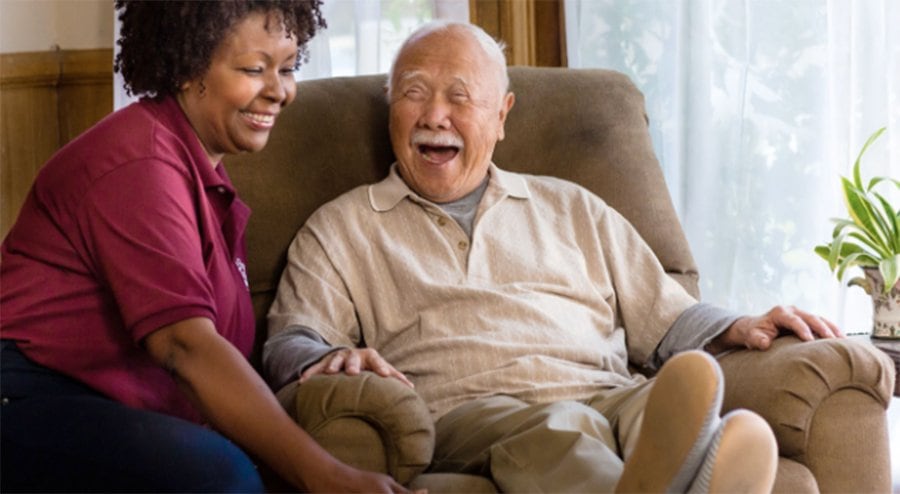Correlating with the escalating numbers of senior citizens opting to stay at home for long-term care has been a marked increase in the availability of home nursing services across the nation, many of which offer an abundance of specialized services in addition to providing basic in-home care for seniors.
Choosing the right home nursing service for long-term care can be an arduous task requiring research into diverse considerations ranging from cost, overall affordability, and the availability of specific services.
Give Your Loved Ones The Best Care
Caring for parents as they age is never easy. The help from home care services allows you to maintain your relationship while providing the best care possible.
Also of critical importance and requiring careful consideration in choosing an in-home nursing service are factors such as trustworthiness, experience, and reliability. With the surge in home nursing services at a current all-time high, many newly established businesses may lack the expertise and resources to provide the level of top-quality care that you demand and expect.
Opting to remain at home during the aging process is a viable decision that is not only feasible but also optimal.
Opting to remain at home during the aging process is a viable decision that is not only feasible but also optimal, as it allows you to exercise autonomy and exert control over the quality of your life and the level of care that you receive.
At Aging In Place, we understand the crucial importance surrounding your decision to remain at home. We wholeheartedly respect the autonomy exercised by senior citizens undergoing the process of planning a happy, content, and fruitful life that is supplemented by top-quality in-home nursing services designed to provide you the care and assistance you require while also enabling you to live a relaxed and comfortable life defined by the aspects of respect, self-reliance, and confidence.
If you are interested in finding out how to make the critically important decision of opting for the best home nursing service for you and your individual needs, read on below. You will find useful tips, easy-to-view charts, and essential advice, in our incredibly informative primer, allowing you to make well-educated and stress-free decisions on choosing the absolute best care service for your needs.
Different Types of In-Home Nursing Care Services

While in-home nursing care may sound like a blanket term describing the basic care and assistance to senior citizens, the truth is that there are myriad types of services available with an immense degree of differences existing within each type of care service.
With a clear understanding of the different home nursing services available to you, the ensuing process of picking the best one to suit your needs becomes immensely more streamlined, with much of the guesswork and uncertainty removed from the decision-making process.
Give Your Loved Ones The Best Care
Caring for parents as they age is never easy. The help from home care services allows you to maintain your relationship while providing the best care possible.
Different Types of Home CareHome care can range from high specialized care like a neurologist’s visit, to generalized care like companionship or housekeeping to help seniors live alone with confidence. Read More
Types Of In-Home Nursing Care Professionals
- Home-health nurses
- Nurse practitioners
- Physician assistants
- Physical therapists
- Physicians
- Occupational therapists
- Home-health type aides
- Personal companions and homemakers
- Personal care attendants
Each of the care professionals listed above offer essential in-home assistance services for senior citizens. With varying levels of education, qualifications, and specific expertise, the types of care professionals and their respective services are available at a wide range of price points, depending on your individual lifestyle and health care needs.
With a clear understanding of the different home nursing services available to you, the ensuing process of picking the best one to suit your needs becomes immensely more streamlined, with much of the guesswork and uncertainty removed from the decision-making process.
Read below to see our easy point-by-point guide on how to identify and subsequently choose the best in-home nursing service for your needs. With us, you are promptly on your way to constructing a personal care blueprint that is perfect for your highly individualized requirements.

Guide to Choosing the Perfect In-Home Nursing Care Service
Identify your individual needs: Begin by taking an “inventory” of your care needs by identifying any and all health issues that you have.
Take into consideration all and any health issues you currently have, as well as the long term care needed.
The maladies afflicting senior citizens range from minor to severe in nature and ultimately determine the type and level of in-home nursing care that one will require to maintain a comfortable, pleasant, and happy life on a day-to-day basis.
Examples of Common Afflictions Found in the Senior Citizen Population Include:
